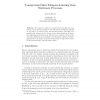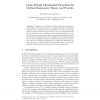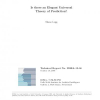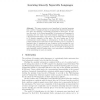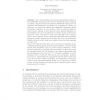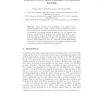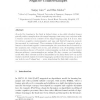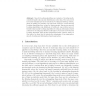105
Voted
ALT
2006
Springer
15 years 11 months ago
2006
Springer
Abstract. We propose a method of unsupervised learning from stationary, vector-valued processes. A low-dimensional subspace is selected on the basis of a criterion which rewards da...
110
Voted
ALT
2006
Springer
15 years 11 months ago
2006
Springer
Abstract. We propose a thresholded ensemble model for ordinal regression problems. The model consists of a weighted ensemble of confidence functions and an ordered vector of thres...
91
Voted
ALT
2006
Springer
15 years 11 months ago
2006
Springer
136
Voted
ALT
2006
Springer
15 years 11 months ago
2006
Springer
This paper presents a novel paradigm for learning languages that consists of mapping strings to an appropriate high-dimensional feature space and learning a separating hyperplane i...
121
Voted
ALT
2006
Springer
15 years 11 months ago
2006
Springer
Most of the existing active learning algorithms are based on the realizability assumption: The learner’s hypothesis class is assumed to contain a target function that perfectly c...
117
Voted
ALT
2006
Springer
15 years 11 months ago
2006
Springer
Abstract. The present study aims at insights into the nature of incremental learning in the context of Gold’s model of identification in the limit. With a focus on natural requi...
112
Voted
ALT
2006
Springer
15 years 11 months ago
2006
Springer
A model for learning in the limit is defined where a (so-called iterative) learner gets all positive examples from the target language, tests every new conjecture with a teacher ...
94
Voted
ALT
2006
Springer
15 years 11 months ago
2006
Springer
Consider an agent interacting with an environment in cycles. In every interaction cycle the agent is rewarded for its performance. We compare the average reward U from cycle 1 to ...
110
click to vote
ALT
2006
Springer
15 years 11 months ago
2006
Springer
Abstract. Smooth boosting algorithms are variants of boosting methods which handle only smooth distributions on the data. They are proved to be noise-tolerant and can be used in th...
136
Voted
ALT
2006
Springer
15 years 11 months ago
2006
Springer
e-Science is scientific investigation performed through distributed global collaborations between scientists and their resources, and the computing infrastructure that enables this...
